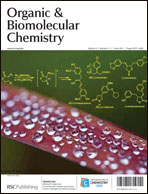Pd0-mediated rapid couplings of CH3I (and then [11C]CH3I) with excess 5-tributylstannyl-2′-deoxyuridine and -4′-thio-2′-deoxyuridine were investigated for the syntheses of [methyl-11C]thymidine and its stable analogue, 4′-[methyl-11C]thiothymidine as PET probes for cancer diagnosis. The previously reported conditions were attempted using Pd2(dba)3/P(o-CH3C6H4)3 (1 : 4 in molar ratio) at 130 °C for 5 min in DMF, giving desired products only in 32 and 30% yields. Therefore, we adapted the current reaction conditions developed in our laboratory for heteroaromatic compounds. The reaction using CH3I/stannane/Pd2(dba)3/P(o-CH3C6H4)3/CuCl/K2CO3 (1 : 25 : 1 : 32 : 2 : 5) at 80 °C gave thymidine in 85% yield. Whereas, CH3I/stannane/Pd2(dba)3/P(o-CH3C6H4)3/CuBr/CsF (1 : 25 : 1 : 32 : 2 : 5) including another CuBr/CsF system promoted the reaction at a milder temperature (60 °C), giving thymidine in 100% yield. Chemo-response of thiothymidine-precursor was different from thymidine system. Thus, the above optimized conditions including CuBr/CsF system gave 4′-thiothymidine only in 40% yield. The reaction using 5-fold amount of CuBr/CsF at 80 °C gave much higher yield (83%), but unexpectedly, the reaction was accompanied by a considerable amount of undesired destannylated product. Such destannylation was greatly suppressed by changing to a CuCl/K2CO3 system using CH3I/stannane/Pd2(dba)3/P(o-CH3C6H4)3/CuCl/K2CO3 (1 : 25 : 1 : 32 : 2 : 5) at 80 °C, giving the 4′-thiothymidine in 98% yield. The each optimized conditions were successfully applied to the syntheses of the corresponding PET probes in 87 and 93% HPLC analytical yields. [11C]Compounds were isolated by preparative HPLC after the reaction conducted under slightly improved conditions, exhibiting sufficient radioactivity of 3.7–3.8 GBq and specific radioactivity of 89–200 GBq µmol−1 with radiochemical purity of ≥99.5% for animal and human PET studies.
![Graphical abstract: Highly efficient syntheses of [methyl-11C]thymidine and its analogue 4′-[methyl-11C]thiothymidine as nucleoside PET probes for cancer cell proliferation by Pd0-mediated rapid C-[11C]methylation](/en/Image/Get?imageInfo.ImageType=GA&imageInfo.ImageIdentifier.ManuscriptID=C0OB01249A&imageInfo.ImageIdentifier.Year=2011)
You have access to this article
 Please wait while we load your content...
Something went wrong. Try again?
Please wait while we load your content...
Something went wrong. Try again?
![Graphical abstract: Highly efficient syntheses of [methyl-11C]thymidine and its analogue 4′-[methyl-11C]thiothymidine as nucleoside PET probes for cancer cell proliferation by Pd0-mediated rapid C-[11C]methylation](/en/Image/Get?imageInfo.ImageType=GA&imageInfo.ImageIdentifier.ManuscriptID=C0OB01249A&imageInfo.ImageIdentifier.Year=2011)

 Please wait while we load your content...
Please wait while we load your content...